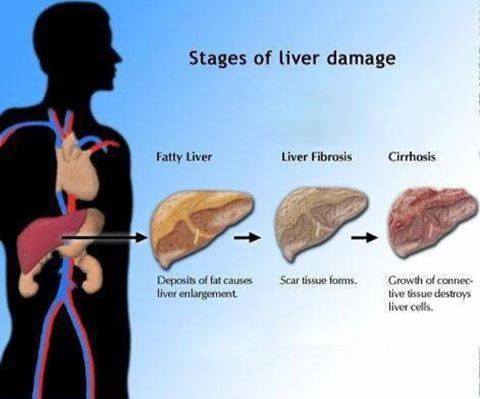We went in to the Gastroenterologist office who is the first step to take when anyone has a issue with their liver. Lee was diagnosed with stage III liver cirrhosis.

We found out that this is called from a condition called NASH Nonalcoholic steatohepatitis. This is caused by fatty liver. The plan from here was for weight loss, and start on a medication called Lactulose to help combat the symptoms of encephalopathy (on this day he was at a grade 2) that had developed after surgery. We were also told we shoulf follow up with the Liver team at IMC in Murrey.
I wanted to add a little education to this blog so it is not just for my personal story but may help others and help our friends and family understand a little more about what is happening in our lives.
What Are the Stages of Hepatic Encephalopathy?
The severity of HE is judged according to your symptoms. The most commonly used staging scale of Hepatic Encephalopathy is called the West Haven Grading System:
- Grade 0: Minimal HE
This stage is very hard to detect as changes in your memory, concentration and intellectual functioning are so minimal that they may not be outwardly noticeable, even to you. Coordination can be affected and although subtle, may impact your ability to drive a car. If you recently had poorer performance at work or have committed a number of traffic violations while driving, it would be worth bringing this to the attention of your healthcare provider. You may be referred for special testing, called neuropsychiatric testing, to evaluate your thinking abilities by doing a number of specifically designed tasks with a trained examiner. If your test reveals some deficits, your healthcare provider will likely schedule frequent follow-up visits to closely follow your condition. There are currently no medications approved by the FDA to treat minimal HE. - Grade 1: Mild HE
You may have a short attention span, notice mood changes like depression or irritability, and have sleep problems. - Grade 2: Moderate HE
You may keep forgetting things, have no energy and exhibit inappropriate behavior. Your speech may be slurred and you can have trouble doing mental tasks such as basic math. Your hands might shake and you can have difficulty writing. - Grade 3: Severe HE
You may be confused as to where you are or what day it is and be extremely sleepy, but can still be woken up. You may be unable to do basic mental tasks, feel extremely anxious and act strangely. - Grade 4: Coma
The last stage of HE is when the person becomes unconscious and slips into a coma.
Later that same day August 30, 2017
Follow up with the surgery team. This appointment went very well Lee healed well from surgery and was told that he did not need any follow up from a surgical standpoint but to keep following up with the liver specialist.
August 30, 2017
Pulmonology (lung specialist) follow up, while staying over-night in the hospital Lee could not keep his oxygen sats up at night even with his c-pap on that he has worn for years. So we followed up with the pulmonologist office. He was ordered an over night pulse ox exam and was also given an antibiotic for a cough that had developed and some tessolon pearls. After finishing the test a few days later Lee was ordered to have oxygen set up for over night only, so now he has the c-pap and the oxygen.
September 4 2017
ER Visit: Lee was having some increased pain where his liver is and and where is gall bladder was removed so we ended up back in the ER. Being a nurse can be a blessing and a curse some times my head goes to the worse case scenario and sometimes I don't want to over react If it is nothing. So with the severe increase of pain that Lee was having I was afraid he was having a bile leak. They took him to CT to scan his belly and it just showed some fluid build up and some portal hypertension. No Leak.


No comments:
Post a Comment